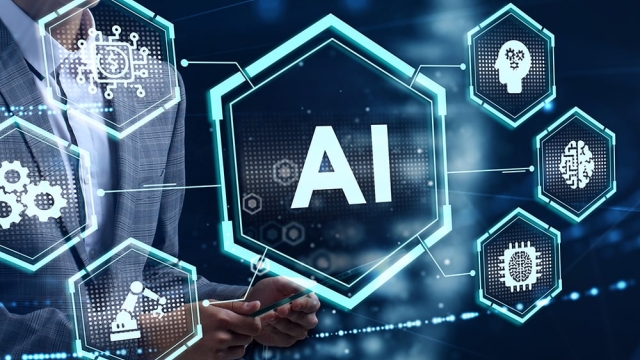
In today’s rapidly evolving business landscape, where technology continues to reshape industries, the accounting sector stands on the cusp of a revolution. The power of artificial intelligence (AI) has started to make its mark, and nowhere is this more evident than in the realm of account software. As businesses strive for efficiency and accuracy in financial management, AI account software has emerged as a game-changer, offering unprecedented capabilities to streamline workflows, enhance decision-making, and unleash the true potential of accounting professionals.
AI account software leverages the immense power of machine learning algorithms to automate the traditionally manual and time-consuming tasks, such as reconciling accounts, categorizing transactions, and generating financial reports. By eliminating mundane and repetitive activities, accountants can redirect their focus towards higher-value tasks, such as analyzing data, identifying patterns, and providing strategic insights to drive business growth. With AI account software seamlessly integrating with existing systems, businesses can achieve higher levels of accuracy, faster turnaround times, and ultimately, make informed financial decisions with confidence.
Moreover, the adoption of AI account software brings about a paradigm shift in how accounting professionals interact with data. By harnessing the power of natural language processing and predictive analytics, these intelligent systems not only process immense amounts of data but also offer real-time insights and forecasts, enabling businesses to stay agile and proactive in a dynamic market environment. The ability to generate accurate financial forecasts, identify potential risks, and spot opportunities for cost savings empowers organizations to make data-driven decisions that impact their bottom line positively.
As AI account software continues to evolve, we can expect further advancements in its capabilities. Enhanced data security measures, improved personalized user experiences, and better integration with other business applications are just some of the areas where AI account software is poised to make significant strides. The future of accounting is undoubtedly driven by the power of AI, where professionals and intelligent software work together harmoniously to unlock greater efficiency and effectiveness in financial management. The potential is immense, and the time to embrace this transformative technology is now.
The Benefits of AI Account Software
AI Account Software is revolutionizing the world of accounting with its numerous benefits. This advanced technology is paving the way for more efficient and accurate financial management.
Firstly, AI Account Software streamlines the entire accounting process. With its smart algorithms and automation capabilities, it can handle repetitive tasks such as data entry, invoicing, and reconciling accounts, saving time and reducing errors. This allows accountants to focus on more strategic and value-added activities, leading to increased productivity and better decision-making.
Accounting Software Singapore
Secondly, AI Account Software enhances data analysis and reporting. By analyzing large volumes of data at a faster pace than humans ever could, it can identify patterns, trends, and insights that may have been overlooked. This enables businesses to make data-driven decisions, optimize financial performance, and identify potential risks or opportunities.
Lastly, AI Account Software improves data security and compliance. With its built-in security features, it ensures the integrity and confidentiality of financial information. It can detect anomalies or fraudulent activities, flagging them for further investigation. Additionally, it helps businesses meet regulatory requirements by automating compliance processes and maintaining accurate audit trails.
In conclusion, AI Account Software offers tremendous benefits to the accounting industry. From streamlining processes to improving data analysis and enhancing data security, it is transforming the way businesses manage their finances. Embracing this technology will undoubtedly lead to greater efficiency, accuracy, and informed decision-making in accounting practices.
Implementation Challenges and Solutions
Implementing AI account software in accounting processes can present several challenges, but fortunately, there are effective solutions available. In this section, we will explore some of these challenges and provide insights into their solutions.
Firstly, one of the significant implementation challenges is the initial cost and investment required to adopt AI account software. Integrating AI technologies into existing accounting systems often entails substantial expenses, ranging from acquiring the software itself to upgrading hardware infrastructure. Nonetheless, organizations can address this challenge by carefully planning and budgeting for the implementation process. By conducting a thorough cost-benefit analysis and considering long-term returns on investment, companies can make informed decisions about the financial resources necessary for successful implementation.
Another challenge that arises in implementing AI account software is the need for comprehensive data management. AI algorithms rely heavily on the availability and quality of data to perform effectively. Therefore, organizations must overcome their data infrastructure limitations and ensure data accuracy, consistency, and accessibility. This can be achieved by employing robust data management systems and establishing data governance protocols. Implementing data validation measures, such as regular audits, can further enhance the data quality and reliability required for AI account software to yield optimal results.
Lastly, integrating AI account software into existing accounting processes often necessitates changes in organizational workflows and employee skill sets. Resistance to change and lack of technical expertise among employees can pose significant challenges. To overcome this, organizations should focus on providing comprehensive training programs and support to their employees. By ensuring that the workforce is equipped with the necessary skills and knowledge to effectively utilize AI account software, companies can mitigate resistance and facilitate a smooth transition.
Overall, while there may be challenges in implementing AI account software, careful planning, data management, and employee training can help organizations overcome these obstacles and fully unleash the power of AI in accounting processes.
3. The Evolution of Accounting Roles in the Era of AI
In the era of AI Account Software, the field of accounting is undergoing a significant transformation. The roles and responsibilities of accountants are evolving to adapt to the new technological advancements. With AI taking over repetitive and manual tasks, accountants are now able to focus on more strategic and value-added activities.
One of the key changes is the shift from data entry and transactional processing towards data analysis and interpretation. AI Account Software is capable of handling large volumes of financial data and performing complex calculations with remarkable speed and accuracy. This allows accountants to spend less time on mundane tasks and more time on analyzing financial information to provide valuable insights to businesses.
Another important aspect of this evolution is the increased emphasis on collaboration and communication skills. As AI takes care of routine tasks, accountants are expected to collaborate with other departments within an organization to gain a deeper understanding of business operations and provide financial advice accordingly. This requires strong interpersonal skills and the ability to communicate complex financial concepts in a clear and concise manner.
Furthermore, the rise of AI Account Software has led to the emergence of specialized accounting roles. Accountants are now expected to have a solid understanding of AI technologies and how they can be applied to improve accounting processes. This includes knowledge of machine learning algorithms, data analytics, and software integration. As AI continues to advance, there will be a growing demand for accountants who can effectively leverage these technologies to enhance financial decision-making.
In conclusion, the introduction of AI Account Software is reshaping the accounting industry. Accountants are now able to focus on higher-level tasks such as data analysis, collaboration, and specialized roles. By embracing the power of AI, accountants can add value to their organizations by providing strategic financial insights and contributing to overall business success.


